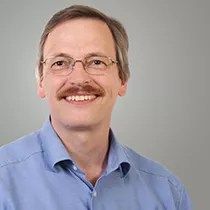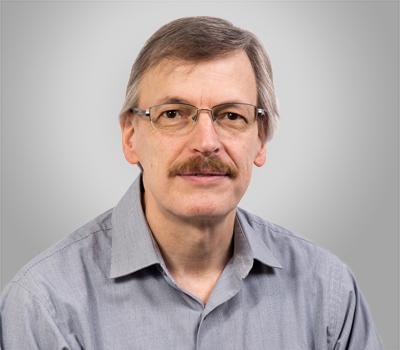
Andreas Weisshaar has always been up for a bit of an adventure or new experience. As a boy he explored his world by taking it apart, especially anything electrical such as tape recorders, radios and telephones. Fortunately, he was equally good at putting things together, although there were often “extra” parts left over.
He was also very impressed with his great uncle who showed him how to build a crystal radio, which runs entirely on the power received from radio waves.
“He pulled all this stuff out of his living room cabinet — a big copper coil, a capacitor for tuning, a whisker detector, and headphones — and we put it together and listened to the radio with no battery! It was quite fascinating for a young boy,” he says. “So when it came to deciding what to study, there was no question in my mind that it was electrical engineering.”
He recalls one of the best adventures in his life was during the summer while he was an undergraduate. Having never traveled too far from his home near Stuttgart, Germany, he and a friend decided to spend a month traveling by train to see all the big cities in Europe including Paris, London, Rome, Vienna, and Zürich.
“That was exciting, just traveling around and seeing the world a little bit. But it was painful at times, because all you had is your backpack and not much food, so sometimes you went hungry. After a year you forget the bad parts and only the good memories stay, so the next summer we did it again!” he says.
Then a new adventure came along — a chance to do an exchange program with Oregon State University. Not only did he complete his Master’s degree here in Oregon, but he also met his soon-to-be wife. He enjoyed Oregon so much that he returned to do his Ph.D., stayed for a post-doc, and took a job here as a professor.
But his adventures didn’t end there. More recently, Weisshaar became a program director with the National Science Foundation, which required him to relocate to Arlington, Virginia. His wife stayed here on their horse farm while he traveled between his two households for nearly three and a half years.
“I enjoyed it. It was a good change for a while, just the exposure of new ideas and learning new skills,” he says. Although he is also glad to be back; he missed being in the classroom and laments missing out on a whole generation of undergraduates.
In fact, his enjoyment of teaching is what drew him to become a professor. “I like mentoring students, and I like research, so I decided academia was the place for me to be,” he says.
The awe he had as a boy in all things electronic inspires his research in high frequency electronics, electromagnetic waves, and communications. His current work involves electromagnetic modeling of microchip components and interconnections between components. The goal of this research is to support the design of increasingly densely integrated microchips for applications ranging from mobile phones to computers. His distinguished career in this industry-relevant field has earned him prestigious Fellow status in IEEE, the world’s largest engineering association.
He continues to stretch himself in other ways too, and his latest adventure is to take up running.
“I haven’t done much of anything for sport for most of my life and thought I should do something, so I started running. I’m glad I did — I really enjoy it. Now if I don’t do it I miss it,” he says.
No matter what is on the horizon for Weisshaar, you can be sure he won’t be standing still.

